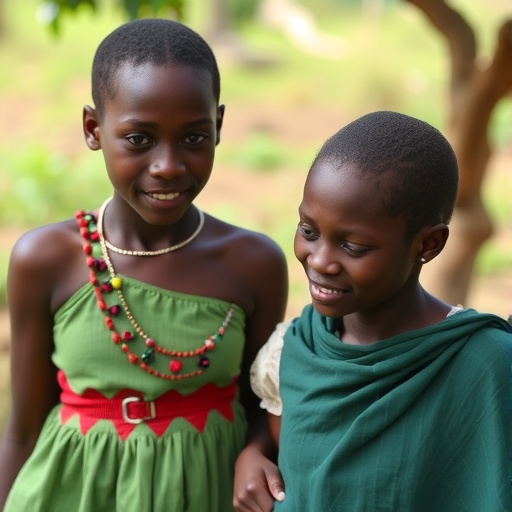In a groundbreaking study, researchers Mounchingam and Adjiwanou have illuminated a crucial yet often overlooked factor contributing to the tragic rates of under-five mortality in Cameroon: the persistent gender inequalities faced by mothers. Over the course of their detailed analysis, which spans from 2011 to 2018, the authors meticulously explore the intersections of maternal health, gender disparities, and child survival outcomes. This comprehensive investigation not only sheds light on the dire implications of these inequalities but also provides essential insights into the broader societal and systemic issues that exacerbate maternal and child health challenges.
At the heart of this study lies the premise that gender inequality is more than just a social issue; it significantly impacts public health outcomes. For women in Cameroon, these inequalities manifest in various dimensions: limited access to healthcare services, lack of education, inadequate economic opportunities, and entrenched cultural norms that prioritize male wellbeing over female health. The researchers argue that these factors create a perfect storm, adversely affecting maternal health during the most critical phases of childbearing and ultimately leading to increased under-five mortality rates.
As they delve deeper into their investigation, Mounchingam and Adjiwanou provide statistical evidence illustrating the correlation between maternal gender inequality and child mortality rates. Their findings highlight that, during the period analyzed, regions with higher levels of gender discrimination exhibited notably higher rates of under-five mortality. This alarming trend serves as a stark reminder of the urgency to address gender disparities if meaningful improvements in child health are to be achieved.
The authors employ a rigorous methodological framework, combining quantitative data analyses with qualitative insights, to unearth the pathways linking maternal experiences of inequality to child health outcomes. By utilizing national health survey data, they illustrate how social determinants, such as education and economic status, significantly shape maternal health experiences and, by extension, the health trajectories of their children. In essence, the study posits that enhancing the status of mothers is not merely a women’s issue; it is a matter of child survival and public health.
Importantly, the research also emphasizes the critical role of policymakers in creating interventions that can effectively reduce gender inequalities. Mounchingam and Adjiwanou call for holistic approaches that not only empower women but also challenge and dismantle the structural barriers that perpetuate these disparities. They emphasize the need for targeted investments in maternal health services, educational opportunities for girls, and economic programs aimed at boosting female agency and decision-making power.
This study further engages with the broader discourse on global health and development, situating Cameroon within the context of Sustainable Development Goals (SDGs). The authors argue that achieving SDG 3, which aims to ensure healthy lives and promote well-being for all at all ages, requires a concerted effort to tackle gender inequality. By aligning gender equity initiatives with health programs, stakeholders can drive more effective outcomes in reducing child mortality.
Moreover, Mounchingam and Adjiwanou highlight the importance of community involvement in addressing these issues. They advocate for grassroots movements that empower women and mobilize communities to foster change. By amplifying women’s voices and experiences, communities can cultivate a more supportive environment for mothers, thereby improving maternal and child health outcomes.
In their discussion, the researchers also dissect the psychological ramifications of gender inequality on mothers. The stress, anxiety, and feelings of inadequacy stemming from systemic discrimination can significantly impact maternal mental health, which is intrinsically linked to child wellbeing. This nuanced understanding of the emotional toll of gender inequality is crucial for developing comprehensive health interventions that address not only physical health but also mental wellness.
Furthermore, the authors explore how cultural beliefs and practices around motherhood can complicate efforts to minimize under-five mortality. In many communities, traditional norms dictate maternal behavior, often restricting access to necessary healthcare resources. By scrutinizing these cultural nuances, Mounchingam and Adjiwanou underscore the need for culturally sensitive approaches in health promotion and education initiatives.
The implications of their findings extend beyond Cameroon, as they resonate with global challenges related to maternal and child health in low- and middle-income countries. The urgency with which health disparities must be addressed is universal, as gender inequities remain a significant barrier to achieving health equity worldwide. This study highlights the necessity for an integrated approach to health policy, where gender considerations are woven into the fabric of all health initiatives.
In conclusion, Mounchingam and Adjiwanou’s research presents a compelling argument for the critical synthesis of gender equality and maternal health strategies. By demonstrating the undeniable connection between gender disparities experienced by mothers and under-five mortality rates, they present a clarion call for immediate action and systemic change. The path forward requires collaboration among governments, non-profits, and communities to forge an inclusive and equitable future for mothers and their children.
By highlighting the systemic nature of gender inequalities that persist in Cameroon, Mounchingam and Adjiwanou’s work challenges us to rethink our approaches to maternal and child health. Their findings serve as a guiding light for future research and policymaking, urging us to dismantle the barriers that jeopardize the health and lives of countless children. This research not only informs public health practice but also inspires a global movement towards greater gender equity and improved health outcomes for the most vulnerable populations.
Subject of Research: The effect of gender inequalities experienced by mothers on under-five mortality in Cameroon.
Article Title: The effect of gender inequalities experienced by mothers on the under-five mortality in cameroon between 2011 and 2018.
Article References:
Mounchingam, A.N., Adjiwanou, V. The effect of gender inequalities experienced by mothers on the under-five mortality in cameroon between 2011 and 2018. J Pop Research 42, 52 (2025). https://doi.org/10.1007/s12546-025-09397-8
Image Credits: AI Generated
DOI: 10.1007/s12546-025-09397-8
Keywords: Gender inequality, under-five mortality, maternal health, Cameroon, public health, Sustainable Development Goals, child survival.




